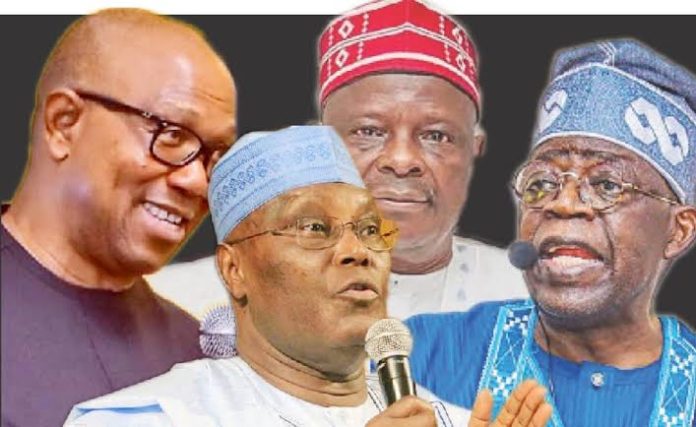Some of us naively expected the 2023 presidential campaigns to be issues-driven. But with only two months before we go to the polls to elect our next president, we are yet to hear about the issue or issues that drive the presidential candidates of APC, PDP, and LP to offer themselves for national leadership. What is at stake in the election?
I am willing to bet that I am not the only one who has heard nothing and seen nothing from the presidential candidates indicating that in aspiring for national leadership, they have more than a nodding acquaintance with the problems that hobble our rise from a potentially great nation to a great nation.
So far, the campaigns are slogan-driven. This has been the pattern since our return to civil rule in 1999. Slogans are important political sound bites with the potential of offering themselves as rallying points around candidates that spin them. The Americans are past masters at this. The late President Ronald Reagan’s slogan was: “Let’s make America great again.” Former President Barack Obama’s slogan was: “Yes we can.” Former President Donald Trump abbreviated Reagan’s slogan to: “Make America great again.”
In 1993, the late Moshood Abiola’s campaign slogan was: “Hope.” In 2011, former President Goodluck Jonathan’s campaign slogan was: “A fresh breath of air.” In 2015, President Muhammadu Buhari’s campaign slogan was: “Change.” In the current presidential campaign, Senator Ahmed Bola Tinubu offers us: “Renewed hope.” Former Vice-president Atiku Abubakar, says “Together, we can do it.”
Campaign slogans are powerful messages. They excite and energise the public. They point the public to a new direction just as they raise hope in the capacity of a potential leader to lead aright. Energising slogans outlive political campaigns. The public usually remembers them long after the elections are concluded.
Slogans derive their relevance from the exploitation of public sentiments; that is why they are often mistaken for solutions to unidentified problems. The call to make America great again carried the message that it was incumbent on all Americans to support Reagan and Trump to recover its lost greatness. It was a heady sell with the added suggestion that those who refused to support the two men in their ambition, could not count themselves among patriotic American citizens.
In Yes, we can, Obama sent out the message that America and the Americans could change their ways and live the truth of their constitutional creed that all men (and women) are created equal with inalienable rights to freedom and the pursuit of happiness.
Abiola’s slogan pointed the nation towards the hope of Nigeria freed from the long winter of khaki rule to the inviting summer of agbada rule. Hope is always a marketable campaign slogan for the very simple reason that we plan on hope, and we live on hope.
Jonathan’s slogan suggested that our country could not move forward if it continued to breathe the stale air of past failures and missteps that reduced the giant of Africa to a giant with short legs. We could identify with that sentiment because we could see that we were growing shorter, not taller as a nation.
Buhari promised change. Change is an action word and when employed as a campaign slogan, it serves as an invitation to believe that a new leader will provide the kind of leadership that will change the way we do things and thus free the nation’s energy held in check by retrogressive steps. End of business as usual.
Tinubu’s renewed hope suggests that the hope that Buhari’s change raised in us in 2015 has been battered and requires a renewal by a new leader. Atiku’s slogan invites us to join hands with him as president to, if you would excuse a hackneyed expression, move this behemoth of a nation forward.
Slogans are powerful messages delivered in either one word, a phrase, or a sentence. They carry both open and subliminal messages. It is their winning nature. But they are neither issues nor are they about issues as such. They point to our hopes, our fears, and our collective dreams for our country. But in and of themselves, slogans do not, whatever may be the degree of their profundity, offer solutions to a country’s problems. Issues must not be conflated with slogans. Issues raise lingering and current problems and proffer solutions to them. But given its capacity to energise the public, a slogan is sometimes taken for a promise.
If a presidential campaign is issue-driven, it subsumes the candidate’s personal ambition to the larger ambition of service to his nation. Issues are those things fundamental to a particular nation at a particular time in its history. They may be problems or have the potential to develop into problems; they may be lingering or current or anticipated future problems.
They tax those who wish to lead with proving that a) they understand the issues that bother the nation, b) that they have given some serious as opposed to perfunctory thoughts to them and c) they can offer sensible and practical approaches to their solution. Issue-driven presidential campaigns generate intense public debates that help the nation to re-evaluate its take on their solutions.
Issue-driven presidential campaigns provide a competitive platform for the political parties. Each political party chooses to deal with an issue close to its heart but hews to a comprehensive national ambition. I refer you to the presidential campaigns in the second republic.
If you were old enough then, you would appreciate the difference between then and the political aridity of now. In the 1978/79 presidential campaigns as well as the 1983 presidential campaigns, two of the biggest political parties, NPN and UPN, were driven by national issues that needed to be addressed to, you got it, move the nation forward.
UPN chose free education at all levels while the NPN chose agriculture. Each political party stood on its chosen issue. NPN could not resist the temptation to square with UPN in education and offered qualitative rather than free education.
If you can, spare some thoughts for the excitements of the times when the two political parties marketed themselves, not on the capacity of their presidential candidates but on issues that drove the country towards its development, to wit, education within the reach of all Nigerians and food on
the table of all Nigerians. Nigerians had alternatives and could, all things being equal, support the party of their choice on the basis of the issue it stood on.
What flows from this is that issue-driven campaigns are driven by the political parties, not by individual presidential candidates. The real tragedy of our political retardation is that the political parties stand on nothing but the ambition to capture power. What does PDP stand for? What does APC stand for? The answer to both questions is power, power to the politicians.
What are the issues on which the 2023 presidential election will be decided? The economy? Insecurity? Unemployment? Corruption? Poverty? Legions of them. They are old and lingering national issues/problems. They have morphed into routine political issues that cannot escape the attention of anyone who aspires to rule our country from the protected luxury of Aso Rock. They are no longer issues that can be put on the table to drive the elections because all of them have been victims of promises made and promises broken.
So, what is new? Bros, na slogans we go chop.



